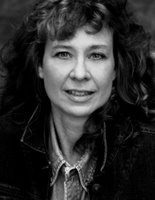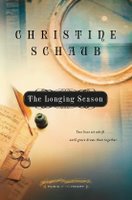 Christine Schaub is an accomplished writer, speaker, actor and pianist. Finding Anna, her debut novel, launched the Music of the Heart series, followed by The Longing Season. Both books received instant acclaim from reviewers and are endorsed by Library Journal, Church Libraries, CCM Magazine, Foreword Magazine and myriad online publications. Schaub lives in Nashville, Tennessee, and invites readers to visit her at www.christineschaub.com.
Christine Schaub is an accomplished writer, speaker, actor and pianist. Finding Anna, her debut novel, launched the Music of the Heart series, followed by The Longing Season. Both books received instant acclaim from reviewers and are endorsed by Library Journal, Church Libraries, CCM Magazine, Foreword Magazine and myriad online publications. Schaub lives in Nashville, Tennessee, and invites readers to visit her at www.christineschaub.com.
What new book or project would you like to tell us about? The Longing Season—the second book in the Music of the Heart series—just released to critical acclaim. This historical series tells the stories behind the writing of our most famous hymns, and The Longing Season is the two-year odyssey behind John Newton’s life and the set-up of “Amazing Grace.” The series is endorsed by Library Journal, Church Libraries, CCM Magazine, Foreword Magazine, and myriad online publications, was translated into Dutch, and went hardcover with Crossings Bookclub.
The Longing Season—the second book in the Music of the Heart series—just released to critical acclaim. This historical series tells the stories behind the writing of our most famous hymns, and The Longing Season is the two-year odyssey behind John Newton’s life and the set-up of “Amazing Grace.” The series is endorsed by Library Journal, Church Libraries, CCM Magazine, Foreword Magazine, and myriad online publications, was translated into Dutch, and went hardcover with Crossings Bookclub.
Tell us about your publishing journey. How long had you been writing before you got a contract? How did you find out and what went through your mind?
I am a rather reluctant novelist. My writing journey started with a BA in journalism, which led to ten years in corporate communications. My specialty was short, snappy copy—headlines, taglines, product descriptions, sales letters. Meanwhile, I was writing and performing five-minute monologues of the hymn stories at conferences, churches and businesses across the Midwest.
When I moved to Nashville, I decided to pursue screenwriting and developed these hymn stories into teleplays—screenplays for television movies. In the midst of shopping the teleplays, I was offered a chance to turn the stories into novels and develop a ready-made audience for the movies. And here’s where I slammed on the brakes. “Nope. Not interested.”
But in the car after the meeting, my film agent turned to me and hissed, “You are a writer. Your assignment is a novel. Write it.” When I argued that I was not a novelist—was a short-story writer at best, he countered with, “A novel is just thirty short stories.” When I argued that I didn’t know the first thing about novel writing, he blasted me with, “Look, just go to the bookstore and get a book—‘How to write a novel.’ It can’t be that much harder than what you’re already doing.”
So I drove to Borders, stomped over to the writing section, and picked up the book, Writing the Breakout Novel by Donald Maass. I followed the directions, wrote four sample chapters and submitted them with a series proposal written by my agent. Two months later, the VP of Bethany House Publishers called and offered me a multiple-book series contract.
And then I thought, what have I done? I’m not a novelist, never wanted to be a novelist, have no interest in being a novelist. But I wanted to get the movies made, so I knuckled down and wrote a novel. Finding Anna—the story behind the hymn “It Is Well With My Soul”—debuted the series October 2005, and it’s been a whirlwind of writing and marketing ever since.
Do you still have self-doubts about your writing?
Of course! I think every successful writer has those late-night moments of shutting down the computer, thinking “Brilliant! Brilliant!”…then waking up hours later, thinking “Fool! You’re a fraud!” Self-doubt creates self-editing and leaves one open for constructive criticism.
Was there ever a time in your writing career you thought of quitting?
Definitely—but only because of the frustrations inherent in the publishing industry. Thank goodness for binding contracts, or people would be quitting all the time.
What mistakes did you make while seeking an editor or agent?
I have wonderfully talented editors and feel like I really dodged the horror-story bullet on that front. My agent mistake was in keeping a film agent in the publishing industry. Those are two very diverse industries with different rules and expectations. My first agent and I had an amicable parting and I’ve since signed on with a literary agency.
What’s the best writing advice you’ve heard?
Write what you know. If you’re politically savvy and like to read thrillers—write them. If you’re constantly seeking out a romance—write it. If you love plots with historical settings—research and write them.
What’s the worst piece of writing advice you’ve ever received?
One writing mantra goes: “Just write randomly, then throw it all out and start over.” That’s an enormous, unpaid waste of time and energy. One wouldn’t apply that mantra to cooking or driving or even doing laundry…so why attempt that with the task of writing?
Do you have a pet peeve having to do with this biz?
For a business in communication arts, publishers are notoriously bad communicators. They offer very little information, and it’s like pulling teeth to get basic updates out of them, like sales status, marketing budget, reviews, promotions.
What do you wish you’d known early in your career that might have saved you some time and/or frustration in writing? In publishing?
I wish I’d understood the publishing industry better—knew what upfront questions to ask, what contractual clarifications to make, how do get marketing/publicity excited about my books.
What are a few of your favorite books?
From mainstream fiction: A Prayer for Owen Meany, by John Irving; the Stephanie Plum series by Janet Evanovich; the Mitford series by Jan Karon.
From Christian fiction: Redeeming Love, by Francine Rivers; anything by Ted Dekker.
What work have you done that you’re especially proud of and why?
During a five-year writing break, I worked at an alternative school with at-risk youth. I was a group therapist and learned to become more of a listener than a problem-solver…and I taught these kids that if you can laugh about it, you can fix it.
Do you have a scripture or quote that has spoken to you lately in regards to your writing?
In Matthew 6:34, Jesus said, “Do not worry about tomorrow, for tomorrow will worry about itself. Each day has enough trouble of its own.” The best I can do is set goals and do what I can to meet them. God will work out the rest.
Can you give us a look into a typical day for you?
I like to tell people that if they peered through my living room windows on any given day, it would look like I’m doing a whole lot of nothing. The muse shows up when she wants to—sometimes at 9:00 am…sometimes at 10 pm. So after the coffee and newspaper, my day is up for grabs. If I’m not feeling particularly creative, I’ll do some organizational work, or marketing, or research, or laundry. Eventually, the ideas come and I’m a flurry of creative genius. (Christine chuckles)
Do you have a word or page goal you set for each day?
Absolutely not. That’s an unrealistic expectation for me. But I do have a subconscious reckoning in the back of mind that flashes little messages, like “if you don’t get two chapters written this week, you’ll never make the deadline.”
Are you an SOTP (seat of the pants) writer or a plotter?
I’m a rabid outliner. Sometimes I outline within the outline. I outline the book, chapter-by-chapter, with dates, settings and topic sentences. Then I’ll often outline chapters in action “beats”—a screenwriting technique.
What author do you especially admire and why?
For my genre, I greatly admire Francine Rivers—she has the gift of storytelling, with emotion so deep and dialogue so clever that I forget to analyze plot.
What is your favorite and least favorite part of being a writer?
I love the flexibility of writing at home—the corporate 9-to-5, one hour for lunch rules were always a struggle for me. But I sure miss that regular paycheck! And the benefits…oh how I miss those health, dental, visual, paid vacation perks.
How much marketing do you do? What's your favorite part of marketing?
I do a tremendous amount of grassroots marketing—postcards, emails, website, book signings, store visits, interviews. I really enjoy interacting with my readers through my website and at book signings.
Do you have any parting words of advice?
The person who cares the most about your book—and your writing career—is you…not the publisher, not your agent, not the reviewers or stores or magazines, not even your mother. So, you have to become almost fearless in making your book a bestseller.
Wednesday, August 16, 2006
Home »
» Author Interview ~ Christine Schaub
Author Interview ~ Christine Schaub
Wednesday, August 16, 2006
5 comments























Thanks, Christine, for a great interview. I'm glad to find another rabid plotter within the sea of SOTPers!
ReplyDeleteWonderful interview. Great advice. I love those verses on worry! God bless!
ReplyDelete"For a business in communication arts, publishers are notoriously bad communicators."
ReplyDeleteThat would be funny if it weren't so true!
Thanks for sharing!
Great, getting to know your story, Christine. Thanks for sharing.
ReplyDeleteChristine's books are great! I loved Finding Anna and am right now in the middle of the Longing Season. Thanks for the interview and for the stories.
ReplyDelete